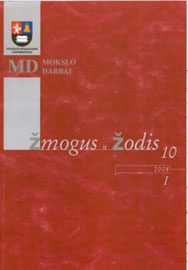Skiemens galinių priebalsių vokalizmas: šnekamosios tarmės poveikis dainuojamajai
Vocalization of End Consonants: Effect of Spoken Dialect on Singing Dialect
Author(s): Rytis AmbrazevičiusSubject(s): Language and Literature Studies
Published by: Vytauto Didžiojo Universitetas
Keywords: Spoken dialect; singing dialect; vocalization ofend consonants; formants; pitch
Summary/Abstract: Results of measurements of vocalized syllable-end consonants arepresented. Samples ofthe speech of eight speakers (three from Aukštaitija (northeast Lithuania) and five from Dzūkija (southern Lithua-nia)) and six singers (three from each ofthe regions) were analyzed. The methods of acoustical analysis (Praat-aided) and statistical analysis were applied. The analyzed parameters include time values ofthe consonants, their SPLs, F1 and F2 of their vocalized parts, and their pitch excursions from the preceding vowels. The collation of the results of consonant measurements led to the following inference: a distinct enunciation in the spoken dialect correlates with the vocalization of consonants in the singing; the difference in the values in speech transforms into the difference in the values of musical parameters, in exaggerated form. Dzūkai show higher values ofthe vocalization, in comparison with Aukštaičiai. Hence, some traits ofthe singing dialect are nei-ther 'purely musical' nor 'purely vocal’, but rather speech-dependent. The results raise some practical implications con-cerning the ethnomusicological studies and practical singing in the contemporary folk groups.
Journal: Žmogus ir žodis
- Issue Year: 10/2008
- Issue No: 1
- Page Range: 9-14
- Page Count: 6
- Language: English

